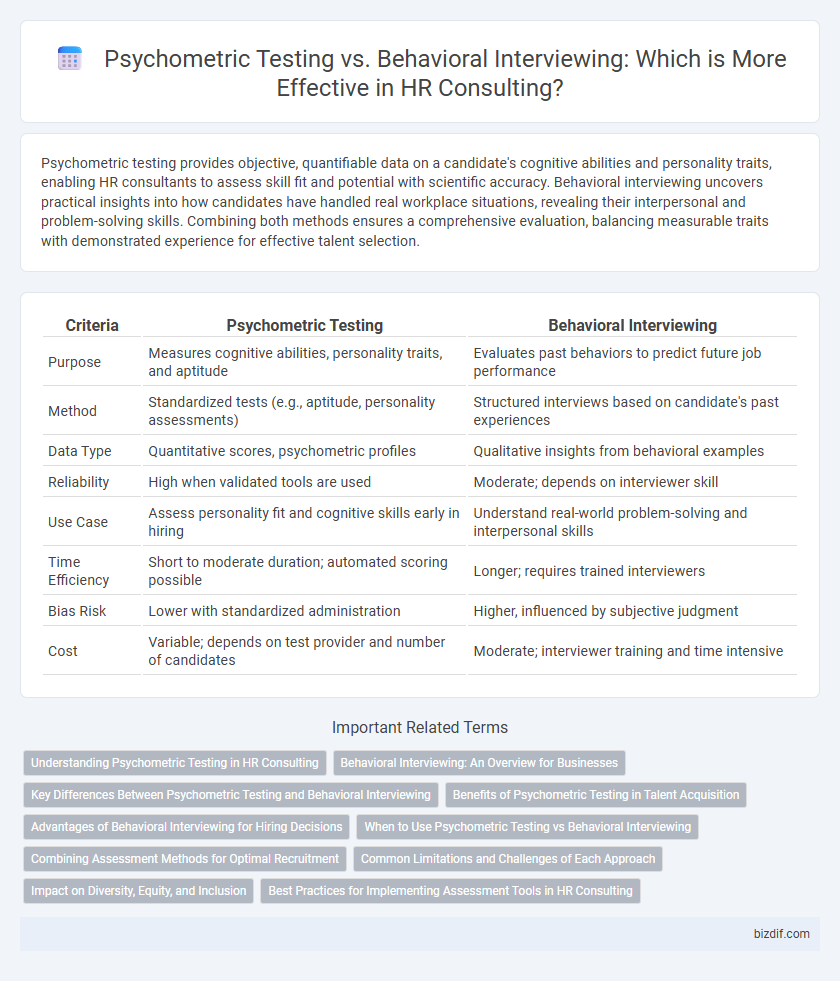Psychometric testing provides objective, quantifiable data on a candidate's cognitive abilities and personality traits, enabling HR consultants to assess skill fit and potential with scientific accuracy. Behavioral interviewing uncovers practical insights into how candidates have handled real workplace situations, revealing their interpersonal and problem-solving skills. Combining both methods ensures a comprehensive evaluation, balancing measurable traits with demonstrated experience for effective talent selection.
Table of Comparison
| Criteria | Psychometric Testing | Behavioral Interviewing |
|---|---|---|
| Purpose | Measures cognitive abilities, personality traits, and aptitude | Evaluates past behaviors to predict future job performance |
| Method | Standardized tests (e.g., aptitude, personality assessments) | Structured interviews based on candidate's past experiences |
| Data Type | Quantitative scores, psychometric profiles | Qualitative insights from behavioral examples |
| Reliability | High when validated tools are used | Moderate; depends on interviewer skill |
| Use Case | Assess personality fit and cognitive skills early in hiring | Understand real-world problem-solving and interpersonal skills |
| Time Efficiency | Short to moderate duration; automated scoring possible | Longer; requires trained interviewers |
| Bias Risk | Lower with standardized administration | Higher, influenced by subjective judgment |
| Cost | Variable; depends on test provider and number of candidates | Moderate; interviewer training and time intensive |
Understanding Psychometric Testing in HR Consulting
Psychometric testing in HR consulting involves scientifically designed assessments that measure candidates' cognitive abilities, personality traits, and behavioral tendencies, providing objective data to enhance hiring decisions. These tests offer quantifiable insights into a candidate's suitability for specific roles, reducing bias and improving predictability of job performance. Integrating psychometric testing with traditional evaluation methods increases the accuracy of talent acquisition strategies and supports effective employee development.
Behavioral Interviewing: An Overview for Businesses
Behavioral interviewing focuses on assessing candidates' past experiences and actions to predict future job performance, making it a practical tool for businesses seeking reliable hires. This method involves structured questions targeting specific competencies, allowing HR professionals to evaluate problem-solving skills, teamwork, and adaptability in real-world scenarios. Implementing behavioral interviews helps organizations reduce turnover rates and enhance employee fit by identifying traits aligned with company culture and role requirements.
Key Differences Between Psychometric Testing and Behavioral Interviewing
Psychometric testing evaluates candidates' cognitive abilities, personality traits, and aptitude through standardized assessments, providing quantitative data for objective comparison. Behavioral interviewing focuses on candidates' past experiences and specific examples of problem-solving, communication, and teamwork skills, offering qualitative insights into behavioral patterns. Key differences lie in psychometric testing's data-driven, trait-based measurements versus behavioral interviewing's narrative-based exploration of real-life competencies.
Benefits of Psychometric Testing in Talent Acquisition
Psychometric testing in talent acquisition provides objective, data-driven insights into candidates' cognitive abilities, personality traits, and emotional intelligence, enabling more accurate predictions of job performance and cultural fit. This method reduces hiring bias by relying on standardized assessments, improving the quality and consistency of recruitment decisions. Companies leveraging psychometric tools experience enhanced employee retention rates and streamlined selection processes, ultimately optimizing workforce effectiveness.
Advantages of Behavioral Interviewing for Hiring Decisions
Behavioral interviewing offers deeper insights into candidates' past actions, revealing how they handle real work situations and challenges, which improves prediction of future job performance. This method assesses soft skills like communication, teamwork, and problem-solving more effectively than psychometric tests, aligning hiring decisions with organizational culture and role-specific demands. Interviewers can tailor questions dynamically, gaining nuanced understanding that supports more accurate, reliable selections and reduces costly hiring errors.
When to Use Psychometric Testing vs Behavioral Interviewing
Psychometric testing is most effective during early recruitment stages to objectively assess candidates' cognitive abilities, personality traits, and aptitude, providing quantifiable data for informed decision-making. Behavioral interviewing excels in later stages, exploring candidates' past experiences and situational responses to gauge cultural fit, interpersonal skills, and problem-solving capabilities. Combining both methods enhances hiring accuracy by balancing data-driven insights from psychometric tests with qualitative behavioral evaluations.
Combining Assessment Methods for Optimal Recruitment
Integrating psychometric testing and behavioral interviewing enhances recruitment accuracy by leveraging objective data and real-world behavior analysis. Psychometric tests provide quantifiable insights into cognitive abilities and personality traits, while behavioral interviews reveal candidates' past experiences and problem-solving skills. Employing both methods together creates a comprehensive evaluation framework, reducing hiring risks and improving talent selection quality.
Common Limitations and Challenges of Each Approach
Psychometric testing often faces limitations such as cultural bias, over-reliance on standardized scores, and restricted insights into real-world behavior, which can impact the accuracy of candidate evaluations. Behavioral interviewing struggles with interviewer bias, inconsistent question application, and the challenge of verifying the authenticity of candidate responses, potentially leading to subjective assessments. Both methods require careful integration and calibration within HR consulting frameworks to mitigate these challenges and improve talent selection outcomes.
Impact on Diversity, Equity, and Inclusion
Psychometric testing offers standardized assessments that can help minimize unconscious bias by providing objective data on candidates' cognitive abilities and personality traits, supporting equitable hiring decisions. Behavioral interviewing, while valuable for understanding candidates' real-world experiences, may introduce subjective bias if not structured effectively, potentially affecting diversity outcomes. Integrating psychometric testing with structured behavioral interviews enhances reliability and fairness, fostering a more inclusive recruitment process aligned with DEI goals.
Best Practices for Implementing Assessment Tools in HR Consulting
Psychometric testing and behavioral interviewing are critical tools in HR consulting that enhance talent acquisition and employee development by providing objective and insightful data. Best practices for implementing these assessment tools include ensuring the validity and reliability of tests, tailoring behavioral interview questions to reflect job-specific competencies, and integrating both methods to create a comprehensive evaluation framework. Utilizing data-driven insights from psychometric assessments alongside qualitative behavioral responses maximizes predictive accuracy and supports informed hiring decisions.
Psychometric Testing vs Behavioral Interviewing Infographic

 bizdif.com
bizdif.com